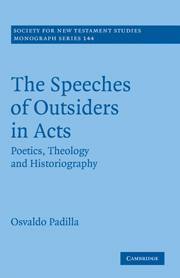Book contents
- Frontmatter
- Contents
- Acknowledgements
- Abbreviations
- 1 Introduction
- 2 The current state of research on the speeches of Acts
- 3 The speeches of outsiders in selected biblical and Second Temple narrative literature
- 4 The Gamaliel speech
- 5 The speech of Gallio
- 6 The speeches of Demetrius and the Ephesian Town Clerk
- 7 The speeches of Claudius Lysias, Tertullus, and Festus
- 8 Conclusions
- Bibliography
- Scripture index
- Index of ancient authors
- General index
3 - The speeches of outsiders in selected biblical and Second Temple narrative literature
Published online by Cambridge University Press: 22 September 2009
- Frontmatter
- Contents
- Acknowledgements
- Abbreviations
- 1 Introduction
- 2 The current state of research on the speeches of Acts
- 3 The speeches of outsiders in selected biblical and Second Temple narrative literature
- 4 The Gamaliel speech
- 5 The speech of Gallio
- 6 The speeches of Demetrius and the Ephesian Town Clerk
- 7 The speeches of Claudius Lysias, Tertullus, and Festus
- 8 Conclusions
- Bibliography
- Scripture index
- Index of ancient authors
- General index
Summary
In this chapter we shall be exploring the place of the Other in literature from selected biblical passages and Second Temple narrative. What function does the outsider play in these writings? In what way does the presentation of the outsider help in the construction of Jewish identity? The fruits that this investigation can yield for our understanding of the function of the speeches of outsiders in Acts are several: (1) it can refine our understanding of Luke's method in Acts by observing similarities and differences between the corpora being compared; (2) it can help us better locate Luke's historiographic matrix; (3) it can help clarify the overall purpose of Luke–Acts; and (4) it can shed light on the historical circumstances of Luke–Acts' audience. All of these issues have and continue to be amply debated in Luke–Acts' scholarship without a dominant consensus having emerged. Therefore, the present chapter is offered as a modest contribution to aid in the progress of our understanding of these issues in Lukan studies. In short, I shall employ the category of the Other (by means of their speeches) as a grid through which to understand the poetics and historiography/theology of the Hebrew and Jewish works examined, and thus shed light on Luke's use of the speeches of outsiders in his second volume.
My investigation in this chapter is restricted to the Greek Bible and Second Temple narratives.
- Type
- Chapter
- Information
- The Speeches of Outsiders in ActsPoetics, Theology and Historiography, pp. 42 - 105Publisher: Cambridge University PressPrint publication year: 2008



